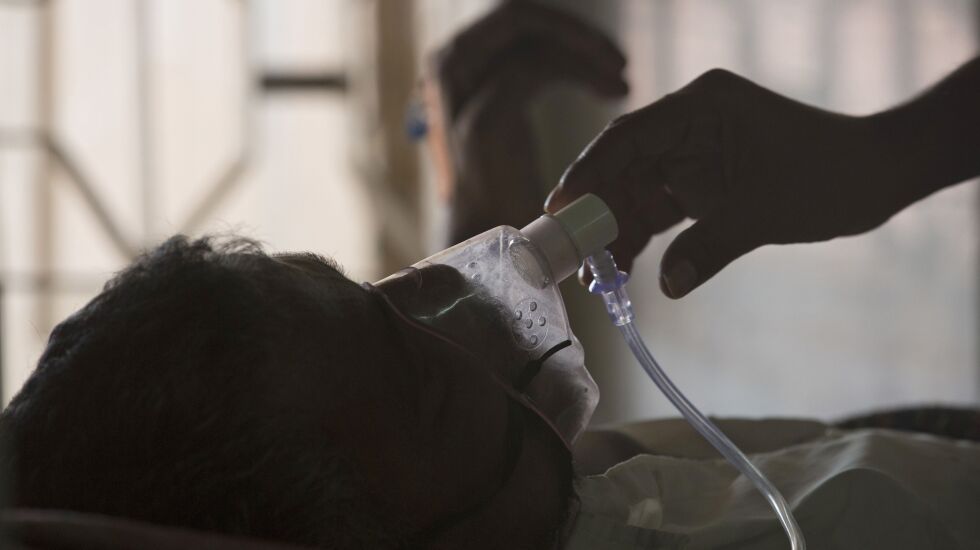
There’s another pandemic, separate from COVID-19, that has gripped the world for generations and involves a disease contracted by millions every year: tuberculosis.
Ten million people contract TB every year, and at least 1 million men, women and children die — every year. And the numbers for both are increasing.
In Illinois, TB diagnoses increased in 2021, likely from missed cases in 2020 due to the disruption in health care services at the start of the pandemic. In 2021, 254 people were diagnosed with TB in Illinois. (Chicago’s North Park Village was once home to one of the largest TB sanitariums in the country.)
TB is a bacterial infection that is spread through the air and predominantly causes respiratory symptoms including cough, fevers, night sweats and weight loss. It is contagious, requires individuals to be isolated and often causes a protracted illness with a high mortality rate.
Yet TB has not received the same attention as COVID-19. If public health infrastructure isn’t strengthened, experts estimate an even greater increase in TB worldwide.
Despite the increasing numbers, pharmaceutical companies have not been lining up to get government contracts and work overtime to find a vaccine. Unlike our collective experience with COVID-19, the global scientific community has failed to come together to collaborate. There are no websites tracking cases in real time or an Anthony Fauci-like champion updating us daily on the status of a vaccine.
A disease that takes a huge toll
As an infectious disease physician and scientist, I strive to strengthen care for people with TB in the U.S., South Africa, Malaysia and Ukraine, among other countries. Here in the U.S., we often quarantine individuals in the hospital until they are no longer infectious, which takes a tremendous toll on patients and their families, as well as health care workers, who are also at higher risk of contracting TB.
I remember patients around the world who became ill and died — young adults who have their whole lives in front of them, mothers and fathers who leave behind young children, and children who have to take so many pills for weeks and months to survive.
Even with appropriate therapy, tuberculosis can be fatal. Not infrequently, TB can become resistant to standard antibiotics and becomes even more complex to manage, requiring medications with substantial side effects and historically poor outcomes.
TB affects people who are impacted by poverty, malnutrition, crowding or medical conditions that lead to compromised immune systems. Like COVID-19, TB disproportionately kills people who are poor and disadvantaged. Affected people are often stigmatized because of the poverty associated with TB, making it harder for them to advocate for themselves.
I greatly admire the efforts of my health care colleagues, scientists and public health officials who responded to COVID-19. The science that has been achieved in the last three years, all that has been learned about how to care for people with COVID-19 and how to prevent COVID-19, has been astounding and heroic.
But I keep wondering why a similar investment cannot be made to address TB, one of many neglected global health threats. As COVID-19 has taught us, infectious epidemics do not respect borders and require a concerted global response.
Such an investment requires resources to bolster public health infrastructure, in the U.S. and globally. There will be those who oppose resources leaving the U.S. Those naysayers should remember this investment will also prevent TB in the U.S.
We have an opportunity to impact a global public health threat. We should build on the partnerships and momentum developed during COVID-19 to address TB.
I call on Congress to move forward EndTB legislation to support TB programs of the U.S. Centers for Disease Control and Prevention and U.S. Agency for International Development.
The U.S. has an opportunity, as a global scientific and public health leader, to spearhead advances that combat and can eliminate TB.
Sheela Shenoi, M.D., is an associate professor of medicine in the section of infectious diseases and the associate director of the Office of Global Health at Yale University School of Medicine. She is a public voices fellow with The OpEd Project.
The Sun-Times welcomes letters to the editor and op-eds. See our guidelines.
The views and opinions expressed by contributors are their own and do not necessarily reflect those of the Chicago Sun-Times or any of its affiliates.







